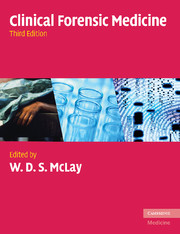Book contents
- Frontmatter
- Contents
- List of contributors
- Preface
- 1 Legal systems: a world view
- 2 Scottish legal system
- 3 The Police in the United Kingdom
- 4 The practitioner's obligations
- 5 The doctor in court
- 6 Custody medicine: physical conditions
- 7 Custody medicine: mental illness and psychological conditions
- 8 Substance misuse
- 9 Alcohol, drugs and driving
- 10 Injury
- 11 Child abuse: physical
- 12 Child abuse: sexual
- 13 Adult sexual offences
- 14 Management of at-risk exposures and infection control in custody
- 15 Scenes of crime
- 16 Forensic science
- 17 Forensic dentistry
- 18 Investigation of death
- 19 Dealing with a major disaster
- 20 Occupational health of police officers
- Index
- References
5 - The doctor in court
Published online by Cambridge University Press: 12 August 2009
- Frontmatter
- Contents
- List of contributors
- Preface
- 1 Legal systems: a world view
- 2 Scottish legal system
- 3 The Police in the United Kingdom
- 4 The practitioner's obligations
- 5 The doctor in court
- 6 Custody medicine: physical conditions
- 7 Custody medicine: mental illness and psychological conditions
- 8 Substance misuse
- 9 Alcohol, drugs and driving
- 10 Injury
- 11 Child abuse: physical
- 12 Child abuse: sexual
- 13 Adult sexual offences
- 14 Management of at-risk exposures and infection control in custody
- 15 Scenes of crime
- 16 Forensic science
- 17 Forensic dentistry
- 18 Investigation of death
- 19 Dealing with a major disaster
- 20 Occupational health of police officers
- Index
- References
Summary
The word forensic derives from the Latin word forum. In Rome, issues of the day were debated in public in the forum. Today, disputed matters such as arise from contracts, or employment, between citizens or companies, even involving the state, may be determined after public debate; these now occur in courts. The word forensic means related to a court, but it has come also to imply trace evidence capable of analysis in the laboratory (forensic science – see Chapter 16). It is the function of a court to hear conflicting evidence about the matter in hand and to determine which argument is (nearer to) the truth.
Types of evidence
The vast majority of people who appear in a criminal court to give evidence are led by the prosecution through a factual account of something that they have witnessed. After presentation of this evidence, the witness is questioned about it by the defence and alternative explanations may be offered for consideration by the witness and the court. When discrepancies are identified, the prosecution has a final opportunity to redress the balance by asking more questions. The court, too, may question the witness. In the case of witnesses for the defence, the same process of examination, cross-examination and re-examination applies. Elaborate rules have developed to ensure that evidence is presented and challenged in a fair way. To witnesses these rules are arcane, and often seem designed to prevent evidence coming before the court, but most have stood the test of time.
- Type
- Chapter
- Information
- Clinical Forensic Medicine , pp. 45 - 50Publisher: Cambridge University PressPrint publication year: 2009



